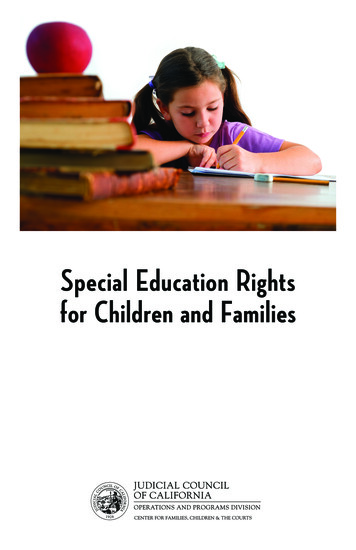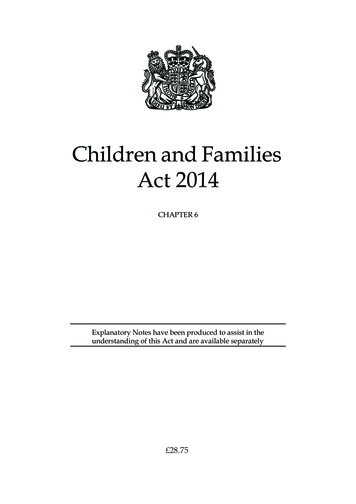
Transcription
Special Education Rightsfor Children and Families
Is your child struggling in school?If you are a parent, foster parent, guardian, or a person who holds educationrights for a school-age child who is struggling in school, this information isfor you. There are many reasons whya child may do poorly in school or notWhat about a child who is not yetwant to attend school regularly, includin school?ing behavioral or emotional issues,A child under the age of 3 with a dislanguage issues, medical problems, orability may be eligible for serviceslearning disabilities. In addition, stufrom a Regional Center through Calidents who are in foster care may havefornia’s Early Start program. To learnexperienced trauma that affects theirmore, visit the website of the Departability to focus on school or leads toment of Developmental Services atsome of these behaviors and issues.www.dds.ca.gov/EarlyStart/index.cfm.It is important to ask for help if your child: Has difficulty reading, writing,or doing math; Has a hard time sitting still,concentrating, and followingdirections; Has problems with speaking orpronunciation; Often forgets where things are; Loses track of time; Has difficulty understandingconcepts such as up and down,left and right, or front and back; Has problems with motor skills suchas holding a pencil; Has trouble with personal routinesfor daily living; or Seems withdrawn or has troublemaking friends.What do we mean by “parent”?For purposes of special education, aparent is a person who has the right tomake educational decisions for a child.This person can be a foster parent, aguardian, a surrogate parent, or anotherresponsible adult appointed by thecourt. If there is no one available to represent the child, the court itself may actas the parent for this purpose. A schooldistrict may appoint an “educationalsurrogate” to hold education rights fora child when the child’s biological parentcannot be located and the court is notinvolved in the child’s life. Here, we use“parent” to mean anyone who holdseducation rights for a child.This information describes the process for identifying the need for specialeducation and the services and supports the school can provide if yourchild is found eligible to receive them.2
Why is it important to identify my child’s needs for specialeducation services as early as possible?Not all disabilities are easy to recognize. Learning disabilities, in particular,may be difficult to identify, especially since children with learning disabilities often have average or above ‑average intelligence. Yet intelligence aloneis not enough to guarantee success in school. Without special services, children with learning disabilities may have difficulty learning and may becomefrustrated and choose to skip class or even drop out of school.What if my child does not speak, read, or write English?The inability to speak, read, write, or understand English is not a disability.However, students who have limited proficiency in English may also havea learning disability or experience other learning challenges. A child withlimited English proficiency who is being evaluated for special educationeligibility has the right to be tested in his or her native language. In addition,parents who are limited English proficient should receive information aboutspecial education and their child’s evaluation in their native language.What kind of help will my child receive if he or she is eligible forspecial education?Special education gives instruction and supports that are speciallydesigned to meet the unique needs of a child whose disability affectshis or her educational performance or ability to learn in a regular classroom. These special services are provided at no cost because state andfederal law requires that all children in public schools who are eligiblefor special education receive a free and appropriate public education.A child who is found eligible for special education may receive a variety ofservices, including speech and language therapy, psychological services,physical and occupational therapy, and counseling services. The child mayalso receive transportation and other supports needed to access and benefitfrom his or her education.3
Where will my child receive special education services?According to both state and federal law, children with disabilities mustreceive their education in the least restrictive environment. This means thatyour child must receive instruction with nondisabled peers to the maximum extent appropriate.If, however, your child’s disability is so severe that education in a generaleducation classroom is not possible, even with support, your child shouldreceive services in a more specialized environment. The school districtmust offer a range of placements for children, including: Instruction in the general education classroom (modified with appropriate supports); Resource specialist services (often called “pull-out” services because achild is usually “pulled out” of the classroom to receive them); Instruction in special classrooms and centers; Instruction in special schools for the visually impaired or for studentswho are deaf or hard of hearing; Home instruction; Placement and instruction in a residential facility such as a hospital orother institution; and Placement in an appropriate nonsectarian, nonpublic school.How will I know if my child needs special education?Both state and federal law list specific disabilities that may qualify a student to receive special education services. These disabilities include: 4intellectual disabilityhearing impairment, including deafnessspeech or language impairmentvisual impairment, including blindnessemotional disturbanceorthopedic impairmentother health impairmentspecific learning disabilitiesautismtraumatic brain injury
If your child has one of thesedisabilities and the disability isinterfering with his or her accessto a basic level of education, yourchild should qualify for specialeducation.Although your child’s schoolhas a legal responsibilityto identify students whoare eligible for special education services, school personnel may notdiscover that your child needs help. If you suspect that your child has a disability that entitles him or her to special education, it is critical that you requestan assessment.What is an assessment?An assessment is an evaluation process that usually involves tests, interviews, and observations designed to identify your child’s strengths andevaluate specific issues related to school performance. For example, if yoususpect that your child has speech and language problems and you requestan assessment of those issues, a speech and language professional willparticipate in the assessment. The assessment results may also identifythe types of special education services your child needs.Who can request an assessment?A parent, teacher, or other service provider, such as a school psychologistor even your family physician, can request an assessment (called a “referralfor assessment”). A referral for assessment must be in writing and shouldbe addressed to the local educational agency (LEA), usually your localschool district.A letter requesting an assessment should state: your child’s full name;your child’s date of birth;your name, address, and phone number;whether your child is currently enrolled in school and, if so, the nameof the school;5
whether your child has ever received special education services; and that your child is having learning problems that you think might requirespecial education services and that you want an evaluation.Deliver the request for assessment to your child’s teacher or schoolprincipal. If your child is not enrolled in school, address it to your schooldistrict’s director of special education. If you do not find anything called“Special Education” in your school district’s phone book or website, lookfor something like “Programs for Exceptional Children” or “StudentServices,” which is often what special education departments are called.Be sure to keep a copy of your referral letter with the date of delivery to theschool district.What happens after the referral for assessment? 15 days Once the school district receives the request for assessment,it must give you a proposed assessment plan within 15 days.The plan must specify the types of assessments to be conducted.It must also state that no special education services will resultfrom the assessment without your consent in writing. 15 days Once you receive the school’s proposed assessment plan, youmay review it to decide whether to consent to the plan. If youagree to the plan, you must sign and return it to the schooldistrict within 15 days. 60 days Once the school receives the signed assessment plan, it has 60calendar days to conduct the assessment and hold a meeting todiscuss the results of the testing. If the school term ends ora vacation of more than 5 days occurs during the assessmentperiod, the non-school days do not count toward the 60-daytime period.How is eligibility for special education decided?After you have agreed to an assessment plan, the school district shouldbegin the assessment and schedule a meeting with you to discuss the results.As a parent, you may be asked to participate in testing by answering additionalquestions about your child’s functioning at home and at school. You have theright to request a copy of the assessment results in your native language.6
You also may request that the written results be given to you before themeeting, to give you time to review them and prepare any questions.At the meeting, the evaluators and professionals who work with yourchild will present the results of the testing and will give their opinion onwhether your child should be considered eligible for special education.As a parent and member of the team, you should also be asked to give youropinion. The final decision as to whether your child is eligible for specialeducation is a team decision.What is the relationship between a child’s disability category andthe services offered?Part of the eligibility determinationinvolves deciding which disability category applies to a child based on the resultsof the assessment. However, regardless ofwhich disability category applies, a childwho is determined to be eligible for specialeducation may receive any of the specialeducation services and supports that areprovided by the school district. For example, the team may decide that a student iseligible for special education because ofan emotional disturbance. However, theremay be indications from the assessmentthat the student needs help with speechand language, too. This student may receive speech and language therapyin addition to counseling services and any other service or support thataddresses a need identified through the assessment.What can I do if the school district believes that my child is not eligiblefor special education services based on its assessment, and I disagree?If you disagree with the school district’s assessment, you have the rightto request an independent assessment from qualified specialists, at public expense. This request should be made in writing and directed to theschool district.7
What will happen if the school district believes that my child is eligiblefor special education services based on its assessment, and I agree?If the results of the assessment are clear and the team agrees that yourchild is eligible for special education services, the school district willprobably propose a plan, called an Individualized Education Program(IEP), for services for your child.What is an IEP?An IEP, or IndividualizedEducation Program, describesboth a process and a written document. Once yourchild is found eligible forspecial education, you willparticipate in the process byattending an IEP meeting atyour child’s school at leastonce a year. At this meeting,you and the other membersof the team will write anIEP document that describes your child’s educational needsand the services that will be provided to meet those needs.The IEP should include: a statement of your child’s present levels of educational performance; a statement of measurable goals, including short- and long-termobjectives; a statement of the special education and related services that your childneeds; an explanation of the extent to which your child will not participate withnondisabled children; and projected dates for services to begin.8
Who develops the IEP?As the child’s parent, you are an essential member of the IEP team.The IEP team consists of: the child’s parents (see What do we mean by “parent”?); at least 1 general education teacher, if the child receives or will receiveservices in a general education classroom; at least 1 special education teacher or provider (for example, a speechtherapist or occupational therapist); a qualified representative of the school district or LEA; the person who conducted the assessment or someone who can interpret the results of the assessment, if the results of an assessment arebeing discussed; other individuals who have knowledge or special expertise about thechild, at the discretion of the parents or LEA; and the child (as appropriate; however, must be invited to participate whendiscussing career and education goals after high school).How soon after the IEP meeting will my child receive help?At the meeting, you will be asked whether you consent to the IEP developedfor your child. If you need more time to review the IEP and other materialsbefore consenting, you may ask for the meeting to be continued at anothertime. Once you give your consent in writing, the school district must implement the IEP as soon as possible. If you do not consent, the district is notrequired or allowed to provide the proposed services to your child.What can I do if the IEP team agrees that my child is eligible, but I donot agree with the level or type of services offered in the IEP?Parents are an important part of the development of the IEP. They shouldbe asked to give their opinions on the services offered, including the type,frequency, and location where services are provided. If you disagree withthe school district about the proposed level or type of services, you haveseveral options: You may refuse to sign the IEP at the initial meeting and take it hometo review further. If you refuse to sign the IEP, the school district is notrequired or allowed to provide the proposed special education servicesto your child. If the purpose of the IEP is to determine eligibility, your9
child will not be considered eligible until you sign the initial IEP. If you areattending an annual review of an existing IEP and you refuse to sign theIEP, the prior plan will remain in effect until resolution. You may sign the IEP and write a note next to your signature saying thatyou agree for the school district to start providing services to your child,but you do not agree that the offer of services is appropriate. This canbe done with a simple sentence on the signature page or can be writtenup in a “Parents’ Addendum to the IEP,” which lays out your concerns ingreater detail.One situation in which this can be helpful is when the parents and theschool district agree on the type of service offered (such as speech therapy), but do not agree on the amount offered (more or less speech therapythan the parents believe is appropriate for the child’s needs). Signing onlyan authorization of services can allow the student to start receivingimportant services while protecting the parents’ right to oppose the IEPand allowing for continuing negotiations with the school district.What can I do if the school district fails to implement the servicesagreed on in the IEP?If a parent or a person who holds educational decision-making rightsagrees to an IEP and the school fails to implement the agreed servicesand supports, a parent or educational rights holder may file a complaintwith the California Department of Education’s Special Education Divisionat www.cde.ca.gov/sp/se/qa/cmplntproc.asp.This process is only used when a school district fails to provide the servicesand supports that are agreed on by the IEP team. If a parent or educationalrights holder disagrees with the school about eligibility or about what services will be provided, this is resolved through a hearing process. See Whatis the “right to request a hearing”?How often will my child’s IEP be reviewed?An IEP meeting must be held at least annually. However, if you are concerned about problems with your child’s current IEP or feel that a new,unaddressed educational issue has arisen for your child, you do not haveto wait until the annual IEP meeting to have these issues reviewed.Instead, you can request that an IEP meeting be held to discuss your concerns. Once the school receives your meeting request, the meeting mustbe held within 30 days.10
Will my child ever be reassessed?Once your child is receiving special education, the school must reassess yourchild every 3 years. These reassessments are called triennial reviews. If necessary, a teacher, parent, or caregiver may request a reassessment sooner.What if my child hurts himself or others, or is destroying property?Because such behavior may interfere with your child’s IEP goals, the schoolis required to develop a behavior intervention plan for serious behavior problems that cause a student to harm himself or others, or that are destructive.The behavior intervention plan is intended to bring about positive behavioral changes. It should be incorporated into your child’s IEP.What if my child is in special education and is suspended or expelledfrom school?A student may be suspended from school if the principal determines thatthe student has committed one of the acts described beginning in section48900 of the California Education Code. Suspension rules apply to specialeducation students just as they apply to nondisabled students. However,if a special education student is suspended for more than 10 consecutiveschool days (or 10 cumulative days for the same or similar offenses) orthere is a decision to expel the student, the district must call an IEPmeeting to determine whether the behavior leading to the suspension isa manifestation (a result)of the student’s disabilityor whether the behavioris a result of the school’sfailure to implement thestudent’s IEP. This meeting is called a manifestationdetermination and requiresthe attendance of theparent and other relevantmembers of the IEP team,as determined by theschool and the parent.11
What if the team determines that the misconduct was nota manifestation of my child’s disability?If the team determines that the conduct was not a manifestation of yourchild’s disability and that the placement was appropriate, then your childwill be subject to regular disciplinary procedures, including expulsion.What if the team determines that the misconduct wasa manifestation of my child’s disability?If the team determines that the conduct was a manifestation of your child’sdisability or that the behavior resulted from the school’s failure to implement the IEP, your child may not be expelled and the school must takemeasures to address his or her behavior.What if I disagree with the conclusions of the team?If you disagree with the team’s conclusions—either about the appropriateness of your child’s placement or the manifestation determination—orwith its decision to rely on certain information, you have the right torequest a hearing.What if my child has not yet been determined to be eligible forspecial education?If your child has not been found eligible for special education and hasengaged in misconduct, he or she may still be protected from disciplineor expulsion if the school knew that your child had a disability before thedisciplinary action. The school is considered to have known of the disability if the parent had expressed concern in writing or submitted a requestfor assessment—or if the child’s teacher or another district employee hadexpressed concern about the child’s behavior—to the director of specialeducation or other supervisory personnel.What rights do parents and other educational rights holders have?With respect to the provision of a free and appropriate public education,federal and state law gives children and their parents certain rights:12
The right to examine all records relating to their child; The right to participate in all meetings related to the identification,evaluation, and educational placement and program of their child; Procedures to protect a child’s rights when the parents are not knownor cannot be located pending the appointment of a surrogate parent; orother educational rights holder; The right to written notice in the parents’ native language before a schoolproposes or refuses to initiate change in the identification, evaluation, oreducational placement of their child; The right to mediation; and The right to present complaints about the identification, evaluation, oreducational placement of their child.What is the “right to request a hearing”?You have the right to request a hearing if you disagree with the school district about the identification, evaluation, or educational placement of yourchild or the provision of a free and appropriate public education. The hearing (often referred to as a “fair hearing” or an “administrative hearing”) isconducted by the state; your child may attend the hearing with you.If your case goes to a hearing in front of a judge, you have the right to: be accompanied by an attorney or other expert;present, confront, cross-examine, and compel the attendance of witnesses;receive a written or electronic record of the hearing;prohibit the introduction of evidence that has not been disclosed at least5 days before the hearing; receive written or electronic findings of fact and a decision no more than45 days after the school has received the hearing request; and receive reasonable attorney fees if you are the prevailing party.Mediation is available in special education cases. You may request mediation instead of a hearing and you may make your request at any point inthe hearing process. If you decide to participate in mediation, you willhave the opportunity to meet with school district representatives in thepresence of a trained mediator. The mediator can help you resolve the disagreement instead of going in front of a judge for a hearing, which can takelonger and cost more money.13
To learn more about your hearing rights and the hearing process, includingthe option for mediation, visit the website of the Special Education Division of the Office of Administrative Hearings at www.dgs.ca.gov/oah/SpecialEducation.aspx. A list of frequently asked questions and answers(FAQs) is available in English, Spanish, Tagalog, Hmong, Vietnamese,and Chinese.Where can I receive more information or assistance?There are a number of resources on the Internet with information forstudents with disabilities and their parents. (If you are the parent or theperson who holds the educational decision-making rights for a foster child,your child’s dependency attorney can help you find resources to addressa suspected disability.) In addition, the following websites provide up-todate information on special education rights and responsibilities:Special education for children from birth through age 3:Alliance for Children’s special-education/Free or low-cost legal assistance with special education matters:Office of Administrative Hearings, Attorney Advocate ocate%20List.pdfSpecial education and school discipline:California Foster Youth Education Task Forcewww.cfyetf.org/publications 11 3259084835.pdf (see Fact Sheet No. 10)Federal and state laws: Individuals with Disabilities Education Act(IDEA), 20 U.S. Code § 1400 et seq.; federal regulations relating to theIDEA, 34 Code of Federal Regulations § 300.1 et seq.; Cal. Educ. Code§§ 56000 et seq. (special education) and 48900 et seq. (school discipline);Cal. Gov. Code § 7579.5 (surrogate parents).This information is based on laws in effect as of September 2016. Federal and statelaws can change at any time.Permission is granted to nonprofit institutions to reproduce and distribute for educational purposes all or part of this work as long as it identifies the Judicial Council, theCenter for Families, Children & the Courts, and the year of publication.14
NOTES15
2016 Judicial Council of California, Center for Families, Children & the Courts.All rights reserved.For additional copies, please contact:Judicial Council of CaliforniaCenter for Families, Children & the Courts455 Golden Gate Avenue, San Francisco, CA 94102-36881-415-865-7739 cfcc@jud.ca.govCFCC0020.16.01
interfering with his or her access to a basic level of education, your child should qualify for special education. Although your child's school has a legal responsibility to identify students who are eligible for special education services, school personnel may not discover that your child needs help. If you suspect that your child has a dis -










